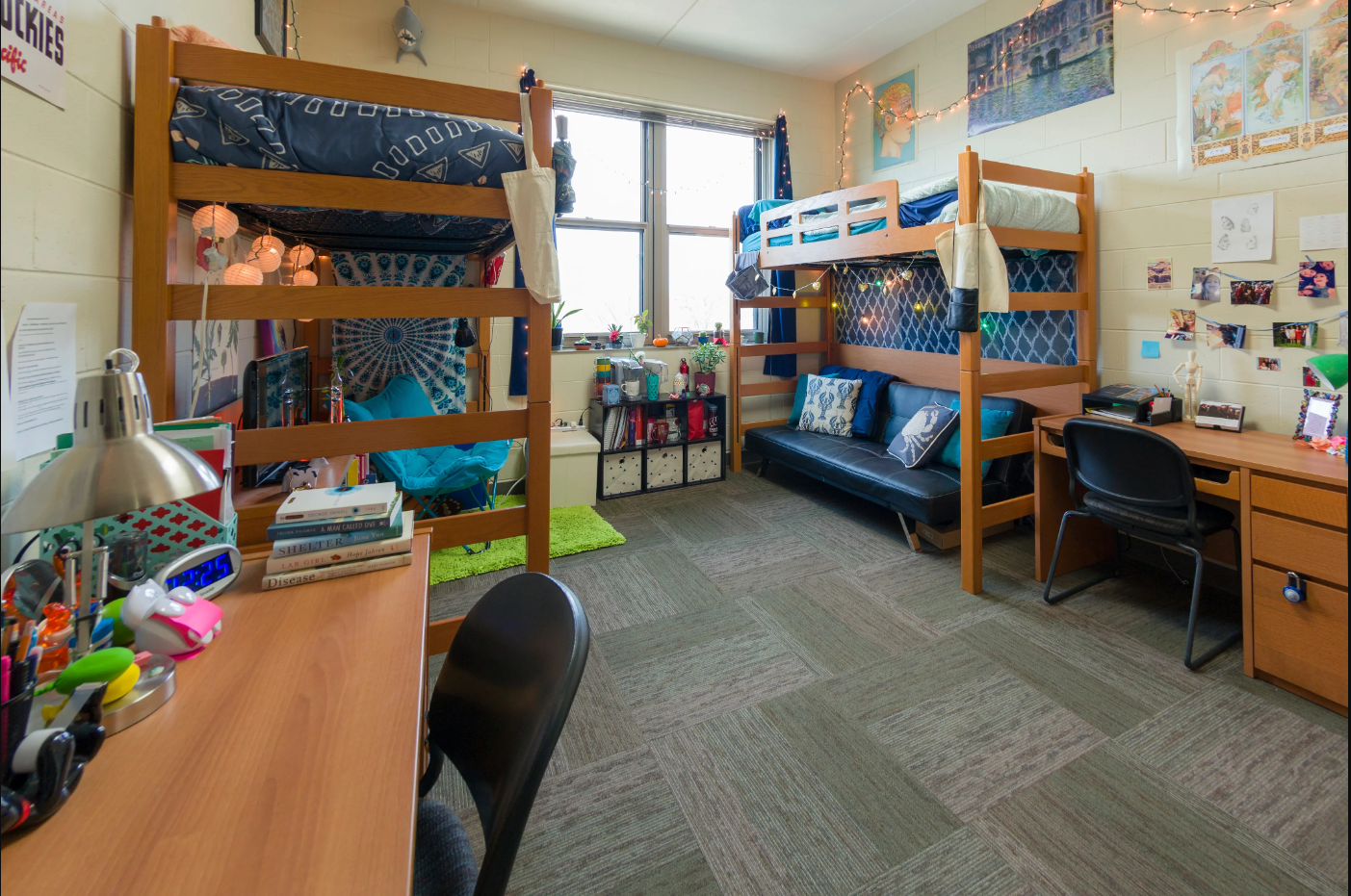The Ultimate Guide To College Hacks
Discover the ultimate guide to college hacks, with tips on how to save money, study smarter, and make the most of your college experience.
Author:Paolo ReynaReviewer:James PierceNov 15, 202311.9K Shares184.5K Views

College life is an exciting yet challenging journey filled with academic pursuits, personal growth, and newfound independence. As students embark on this adventure, they often encounter a myriad of challenges, from academic pressures to managing finances and balancing a social life. This is where the concept of "college hacks" comes into play.
College hacks are innovative and resourceful strategies that students employ to navigate the complexities of university life more efficiently. These hacks encompass a wide range of tips and tricks, from study techniques that enhance academic performance to budgeting strategies that help students make the most of their financial resources. Essentially, college hacks are the shortcuts and clever approaches that make the college experience more manageable and enjoyable.
College life can be overwhelming, and the demands placed on students are multifaceted. Academic responsibilities, social engagements, and the need for personal well-being create a unique set of challenges. College hacks provide students with the tools and insights needed to streamline their journey, helping them overcome obstacles and make the most of their time and resources. These hacks empower students to not only survive but thrive in the demanding environment of higher education.
College hacks are important because they can help students succeed academically, financially, and socially. By using college hacks, students can save time and money, reduce stress, and get more out of their college experience.
College hacks can benefit all students, regardless of their age, major, or financial background. Freshmen can use college hacks to adjust to college life and get off to a good start. Sophomores and juniors can use college hacks to stay on top of their academics and get involved in extracurricular activities. Seniors can use college hacks to prepare for graduation and land their dream job.
Academic College Hacks
Save Money On Textbooks
- Buy used textbooks. You can find used textbooks at your school bookstore, online retailers such as Amazon and Chegg, and even local thrift stores and garage sales.
- Rent textbooks. Many bookstores and online retailers offer textbook rentals. This is a great option if you only need a textbook for a semester.
- Borrow textbooks from the library. Many libraries have a large collection of textbooks that students can borrow for free.
- Share textbooks with friends. If you have a friend who is taking the same class as you, you can share the cost of the textbook.
Study More Effectively
- Create a study schedule. Schedule time each day to study for your classes. Be sure to include time to review your notes, read the textbook, and practice with practice problems.
- Find a study buddy. Studying with a friend or classmate can help you stay motivated and focused.
- Take advantage of office hours. If you are struggling with a concept or assignment, don't be afraid to ask your professor for help.
- Use active learning strategies. Active learning strategies, such as creating flashcards, taking practice tests, and teaching the material to someone else, can help you learn more effectively.
Get Organized For Class
- Use a planner. A planner can help you keep track of your assignments, due dates, and exams.
- Create a filing system. Create a filing system to organize your notes, handouts, and assignments.
- Keep your notes neat and tidy. Take your notes in a notebook or on a computer and be sure to organize them by subject and date.
Manage Your Time Wisely
- Prioritize your tasks. Not all tasks are created equal. Prioritize your tasks so that you are working on the most important things first.
- Set deadlines. Set deadlines for yourself for completing assignments and studying for exams.
- Take breaks. It is important to take breaks while you are studying to avoid burnout. Get up and move around every 20-30 minutes.
Ace Your Exams
- Study regularly. Don't wait until the night before the exam to start studying.
- Review your notes. Review your notes carefully and be sure to understand all of the concepts.
- Practice with practice problems. Practicing with practice problems can help you identify your strengths and weaknesses and prepare for the different types of questions that may be on the exam.
- Get a good night's sleep before the exam. Getting a good night's sleep will help you be alert and focused on the day of the exam.
Financial College Hacks
Get Scholarships And Financial Aid
There are many different types of scholarships and financial aid available to college students. To find scholarships, you can search online databases, talk to your school's financial aid office, and contact organizations related to your major or interests. To apply for financial aid, you will need to complete the Free Application for Federal Student Aid (FAFSA).
Here are some tips for getting scholarships and financial aid:
- Start early. The earlier you start applying for scholarships and financial aid, the more time you will have to find opportunities and complete applications.
- Be organized. Keep track of all of the scholarships and financial aid applications that you submit.
- Be thorough. Complete each application carefully and be sure to answer all of the questions.
- Be honest. Make sure that all of the information that you provide on your applications is accurate and complete.
Create A Budget And Track Your Spending
A budget is a plan for how you will spend your money. It can help you stay on track with your finances and avoid overspending. To create a budget, you will need to list all of your income and expenses. Once you have listed your income and expenses, you can start to allocate your money to different categories, such as housing, food, transportation, and entertainment.
There are many different ways to track your spending. You can use a budgeting app, spreadsheet, or even just a notebook. To track your spending, simply write down everything that you spend money on, including the amount of money that you spend and the date.
Save Money On Food And Housing
There are many ways to save money on food and housing. Here are a few tips:
- Food -Cook at home instead of eating out. Pack your lunch for work or school. Buy in bulk and freeze food for later. Use coupons and discounts.
- Housing -Live off-campus instead of on-campus. Get a roommate. Share a kitchen and bathroom with your roommates.
Find Part-time Jobs And Internships
There are many different ways to find part-time jobs and internships. You can search online job boards, network with people you know, and attend career fairs.
Here are some tips for finding part-time jobs and internships:
- Tailor your resume and cover letter to each job that you apply for.
- Practice your interviewing skills.
- Be persistent. Don't give up if you don't get the first job or internship that you apply for.
Dorm Life College Hacks
Maximize Your Limited Dorm Space
Dorm rooms are notoriously small, so it's important to maximize your space in any way you can. Here are a few tips:
- Loft your bed. This will free up a lot of space on the floor that you can use for a desk, storage, or seating.
- Use under-bed storage bins. This is a great way to store clothes, bedding, and other items that you don't use on a daily basis.
- Hang things up. Use shelves, hooks, and other wall storage solutions to organize your belongings and keep them off the floor.
- Use furniture that has multiple functions. For example, you can get a bed frame with built-in storage drawers or a coffee table that lifts up to reveal a hidden storage compartment.
Get Along With Your Roommates
Living with roommates can be a great experience, but it's important to communicate openly and be respectful of each other's space and belongings. Here are a few tips:
- Set ground rules at the beginning of the semester. This could include things like cleaning schedules, noise levels, and guest policies.
- Be communicative. If you have any problems or concerns, talk to your roommates about them directly.
- Be respectful of each other's space and belongings. Don't borrow anything without asking and always put things back where you found them.
- Be willing to compromise. Everyone has different needs and preferences, so be willing to compromise to make sure that everyone is happy.
Create A Comfortable And Inviting Living Space
Your dorm room should be a place where you can relax and feel comfortable. Here are a few tips for creating a comfortable and inviting living space:
- Add personal touches. Bring items from home that remind you of your family and friends. Hang up posters or photos that you love.
- Make sure your bed is comfortable. Invest in a good mattress and bedding.
- Add some greenery. Plants can help to purify the air and make your room feel more alive.
Stay Organized And Clean
It's important to keep your dorm room organized and clean to avoid feeling overwhelmed and stressed. Here are a few tips:
- Create a cleaning schedule. Schedule time each week to clean your room. This will help you stay on top of things and avoid letting the mess get out of control.
- Put things away as soon as you're done using them. Don't let clutter pile up.
- Create a system for organizing your belongings. Use shelves, drawers, and other storage solutions to keep your things tidy.
- Do your laundry regularly. Don't let dirty clothes pile up in your room.
Social Life College Hacks
Make Friends In College
Making friends in college can be challenging, but it's important to have a social support system. Here are a few tips:
- Get involved in extracurricular activities. This is a great way to meet people who share your interests.
- Attend campus events. This could include sporting events, concerts, lectures, or club meetings.
- Join a study group. This is a great way to get to know your classmates better.
- Be open to meeting new people. Don't be afraid to talk to people in your classes, in your dorm, or at campus events.
Get Involved In Extracurricular Activities
There are many different types of extracurricular activities available to college students. You can find clubs and organizations for just about any interest, from sports and academics to music and the arts.
To get involved in extracurricular activities, start by exploring the different options that are available. You can browse the student life website, talk to your advisor, or ask your friends and classmates for recommendations. Once you have found a few activities that you are interested in, contact the club or organization leaders to learn more about how to join.
Here are a few tips for choosing extracurricular activities:
- Choose activities that you are passionate about. This will make it more enjoyable to participate in the activities, and you will be more likely to stick with them.
- Choose activities that fit your schedule. Don't overload yourself with too many activities.
- Choose activities that will help you reach your goals. For example, if you are interested in a career in business, you may want to join a business club or organization.
Balance Your Social Life With Your Academics
It's important to balance your social life with your academics. Here are a few tips:
- Create a schedule. Schedule time each week for both studying and socializing.
- Prioritize your tasks. Not all tasks are created equal. Prioritize your tasks so that you are working on the most important things first.
- Be realistic about your time. Don't try to cram everything into one day.
- Take breaks. It's important to take breaks while you are studying and socializing. Get up and move around every 20-30 minutes.
Stay Safe And Healthy While Socializing
It's important to stay safe and healthy while socializing. Here are a few tips:
- Be aware of your surroundings. Pay attention to what is happening around you and be aware of potential hazards.
- Don't drink and drive. If you are going to drink, make sure to have a designated driver.
- Use protection. If you are going to have sex, use protection to prevent sexually transmitted infections.
- Be selective about who you trust. Don't share personal information with people you don't know well.
Frequently Asked Questions - College Hacks
Do College Hacks Apply To Graduate Students As Well?
Yes, many college hacks are applicable to graduate students. While the academic demands may differ, strategies for time management, efficient studying, and maintaining work-life balance are universally beneficial.
Can I Use College Hacks For Online Classes?
Absolutely! College hacks can be adapted for both traditional in-person classes and online learning. Strategies for time management, effective studying, and staying organized are particularly relevant for online education.
How Can College Hacks Help With Stress Management?
College hacks often include tips for stress relief, such as mindfulness exercises, effective time management, and finding a healthy balance between academic and personal life. Implementing these strategies can contribute to overall well-being.
Conclusion
Mastering the art of college through strategic and resourceful approaches, commonly known as "college hacks," is a transformative journey for students. These hacks serve as invaluable tools, offering practical solutions to the multifaceted challenges of university life. By incorporating time-tested strategies, students can optimize their academic performance, manage their finances judiciously, and strike a balance between studies and personal well-being.
College hacks are not a mere collection of tips; they represent a universal toolkit for students at every stage of their academic journey. Whether you're a freshman navigating the intricacies of campus life or a seasoned graduate student, these hacks provide a roadmap to success, fostering a seamless and fulfilling college experience. As you embrace these hacks, remember that the key lies in adaptability — tailoring these strategies to your unique circumstances to unlock your full potential and thrive in the dynamic environment of higher education.

Paolo Reyna
Author

James Pierce
Reviewer
Latest Articles
Popular Articles


